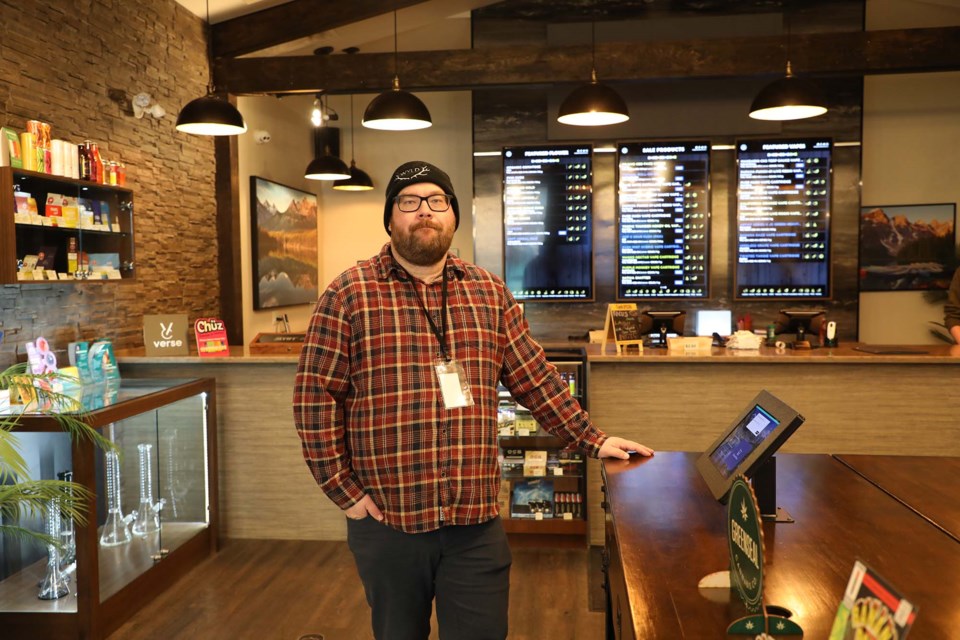Thanks to recent amendments to the Gaming, Liquor, and Cannabis Act, local cannabis retailers can now deliver their wares right to St. Albert residents' doorsteps.
Effective since March 8, the amendments have made it possible for licensed Alberta cannabis retailers to sell cannabis online and provide delivery, something that was previously only an option for Alberta Gaming, Liquor and Cannabis (AGLC).
Azam Ayoob of The Wanted Leaf Cannabis Co. said the shop would be ready to start delivering cannabis products to customers’ doors late last week.
“I am very excited,” said Ayoob.
But not all local retailers are ready to dive into delivery.
Out of 10 St. Albert cannabis retailers called, only two were set up to deliver their products to customers last week, the rest said they weren't offering delivery service, or that they would be rolling it out in the coming weeks.
Matt Kujula, a manager at Rocky Mountain Roots, said they would likely launch delivery in the coming weeks, but it likely won’t be on-demand delivery due to strict regulations by the AGLC.
“We probably are going to launch some sort of limited delivery, where we deliver between noon and five, or something like that,” he said.
As per AGLC regulations, cannabis retailers are unable to hire a third-party service to deliver cannabis products, which means customers won’t see pot delivery on service websites such as Skip-the-Dishes or DoorDash.
Under regulations, only individuals hired directly by the licensee or common carriers are allowed to deliver products for a store and they must have a SellSafe certificate.
In an emailed response on why it was decided to not allow cannabis retailers to use third-party delivery services unlike liquor sellers, which can utilize services such as Skip-the-Dishes and Uber Eats, the AGLC said, “only individuals employed directly by the licensee or a common carrier may conduct the deliveries. To permit third-party delivery services would require changes to legislation. This may be considered in the future.”
Kujula said although it seems to be easy enough to get an endorsement to offer deliveries, the rules make it difficult for mom-and-pop organizations. They will either have to hire an employee directly for deliveries or they can only deliver at peak times during the day.
“Everyone basically has expectations in any retail customer service setting. You want to match your customers’ expectations, and then meet them. If people's expectations are that they can buy something pretty much anytime that we’re open, that's not going to be the case.
“As a company, ... do we do some sort of limited delivery, while we can, and see how it goes? Or do we just not do it at all? Because if we roll out this limited delivery, and then people's expectations are not met, they'll be upset,” he said.
He also worries that if the shop hires someone for deliveries and then the legislation changes and they can access a third-party delivery service, they'll have to eliminate that role.
“You're basically spending money and a person is basically being hired and they rely on that job for income. If the government changes their mind and they're just like, ‘You can use DoorDash,’ all of these people instantly lose their jobs,” he said.
Kujula also said he has an idea about how many people will take advantage of cannabis delivery based on how many people use the shop's click-and-collect service — between two per cent and five per cent of their overall sales.
He isn’t sure hiring someone specifically for deliveries will be worth it for the company.
“It's kind of a paradox how the delivery system is about as inconvenient as possible. And that's what's really holding it back. ... Delivery has to be cheap and easy. And it's not cheap and easy,” he said.
Kajula has what he calls an obvious answer to the question and a more radical answer about why there seems to be a double standard between alcohol and cannabis.
“If you were talking to a spokesman for Health Canada or AGLC, what they would say is the mantra, “We can always ease restrictions, it's easy to ease restrictions, it's easy to cut the red tape, it's harder to put it back up. We're just being slow and cautious and careful,’” he said.
His radical view is that Health Canada as a federal institution does not like cannabis.
“They do not believe that cannabis is in the best interest of the health Canadians. And they also feel the same way about alcohol but if [Alberta Health Services] and your federal, provincial, and municipal governments were to take away and re-regulate alcohol, it will lose votes,” he said.



